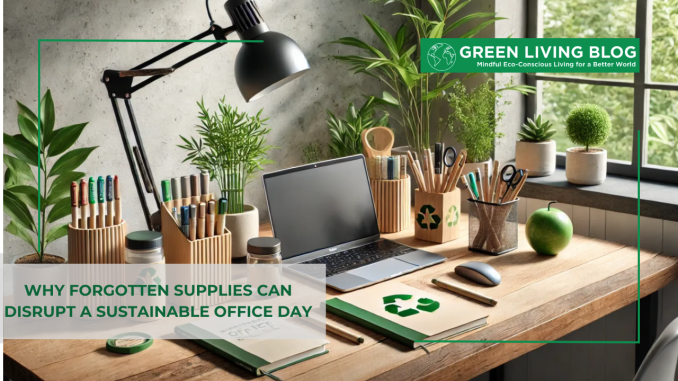
It’s always the little things that catch you out.
A truly sustainable office isn’t just powered by renewable energy or stocked with recycled paper — it’s also shaped by the everyday choices that reduce waste, conserve resources, and support a smooth, eco-conscious workflow. While it’s easy to remember the obvious supplies like pens, notebooks, or printer paper, it’s often the overlooked items that cause the biggest disruptions — and create the most unnecessary waste — when they run out.
Forgotten essentials can throw a wrench into an otherwise productive, green day. Imagine reaching for a stapler and realizing you’re out of staples. Or heading to the kitchen for your reusable coffee filter, only to discover someone discarded the last one and no one replaced it. These moments, though small, create bottlenecks. They slow things down, encourage quick fixes, and often lead to emergency purchases — which usually come with excess packaging, inefficient shipping, and little consideration for their environmental impact.
Sustainable stocking: never run out of the essentials

Running out of something as basic as toilet paper isn’t just a logistical issue — it reflects on your values. Choosing sustainable, responsibly sourced essentials and keeping a mindful, well-managed stock helps reduce panic-buying and waste. It also signals a commitment to both comfort and care — for the people using the space and for the environment.
Offices that consistently maintain a stock of bamboo-based toilet paper, biodegradable cleaning products, or refillable pens are taking quiet but powerful steps. These decisions may not make headlines, but they form the backbone of a workspace that values sustainability at every level. It’s in these small choices that the most authentic eco-conscious culture is built.
Think beyond the standard — and the single-use
When it comes to office supplies, most people only think of standard A4 paper or basic sticky notes. But true sustainability means looking at the bigger picture — and being smarter about what we stock. Offices can benefit from offering a broader range of paper sizes and types, especially those made from recycled or FSC-certified sources. This kind of foresight means fewer reprints, better formatting, and less paper waste overall.
Consider needing to print a large-format presentation and realizing you only have standard paper in stock. Resorting to taping sheets together is not only inefficient — it’s wasteful. Anticipating needs, stocking purpose-fit supplies, and sourcing greener options ahead of time prevents these frustrating moments. It also shows that your office isn’t just reacting to problems — it’s designing solutions proactively.
Small items, big disruptions
It’s easy to underestimate the importance of small, often forgotten items: whiteboard markers, batteries for a wireless mouse, envelopes, cleaning clothes, USB drives, and even hand soap. When these items run out, they interrupt the flow of work, force last-minute trips to the store, and sometimes result in bulk purchases that don’t align with sustainability goals.
Additionally, last-minute replacements are rarely eco-friendly. In a rush, teams may pick up whatever is available — often products with excess plastic packaging or poor environmental credentials. By keeping a low-waste inventory and regularly auditing what’s in short supply, offices can avoid these traps and maintain a consistent level of sustainability.
Plan ahead, waste less and do more
Running out of supplies doesn’t just cause delays; it leads to waste — both in terms of materials and energy. Last-minute orders often come with express delivery, adding unnecessary emissions. Emergency purchases might result in duplicate items, excessive packaging, or non-recyclable products that end up in landfills. A proactive approach to stocking — one that anticipates needs and embraces a low-waste ethos — can prevent these outcomes.
Offices should consider establishing a sustainable inventory system. This includes using digital tools to track usage trends, encouraging staff to report low stock early, and partnering with eco-conscious suppliers. A well-organized supply system saves time, supports the environment, and creates a sense of shared responsibility among team members.
Sustainability thrives in the details
Ultimately, a sustainable office isn’t built only on bold initiatives or headline-grabbing goals. It thrives in the small systems and everyday habits that support mindful, intentional work. When everything functions seamlessly — from having the right paper size to never running out of reusable cleaning supplies — people are free to focus on what matters most: doing great work in a space that’s respectful, resilient, and designed to last.
By treating forgotten supplies as a priority — rather than an afterthought — we create a workplace that’s not just efficient, but also forward-thinking and deeply committed to environmental responsibility. In the world of sustainability, even the smallest decision has the power to make a big impact.
![]()
Author Profile
- Passionate content creator, contributor, freelance writer and content marketing allrounder.
Latest entries
 Green LivingJanuary 15, 2026Green Transport Options for People with Mobility Challenges
Green LivingJanuary 15, 2026Green Transport Options for People with Mobility Challenges DictionaryJanuary 13, 2026Is Trend-Driven or Evergreen Sustainability Content Winning in 2026?
DictionaryJanuary 13, 2026Is Trend-Driven or Evergreen Sustainability Content Winning in 2026?  Green LivingDecember 18, 2025Self-Service Hydration: Should You Choose Mains-Fed or Bottled Water?
Green LivingDecember 18, 2025Self-Service Hydration: Should You Choose Mains-Fed or Bottled Water? DictionaryDecember 16, 2025UK Eco Christmas Gifting Trends 2025: Expensive Presents or Sustainable Experiences?
DictionaryDecember 16, 2025UK Eco Christmas Gifting Trends 2025: Expensive Presents or Sustainable Experiences?







Leave a Reply
You must be logged in to post a comment.